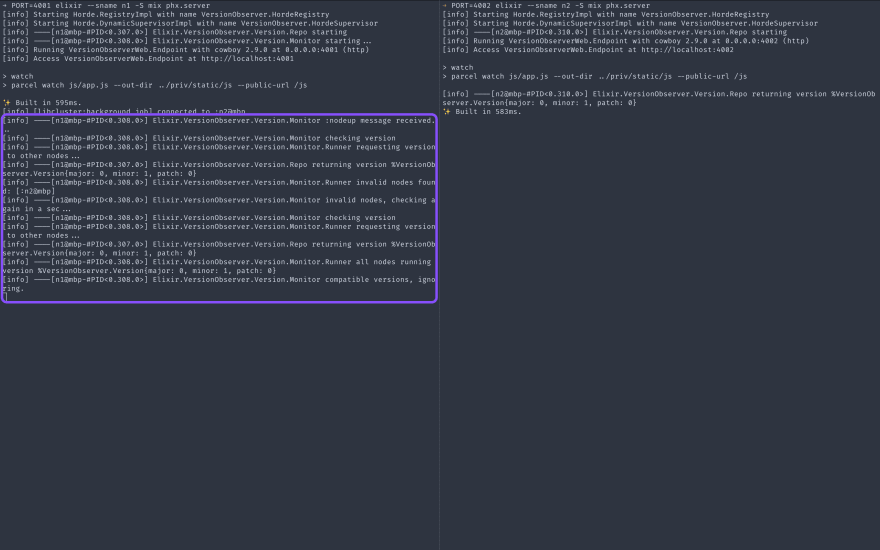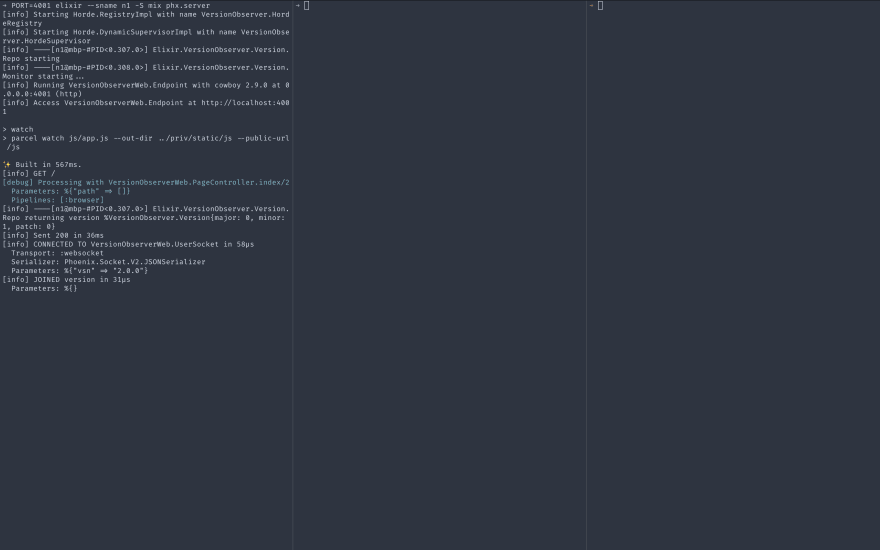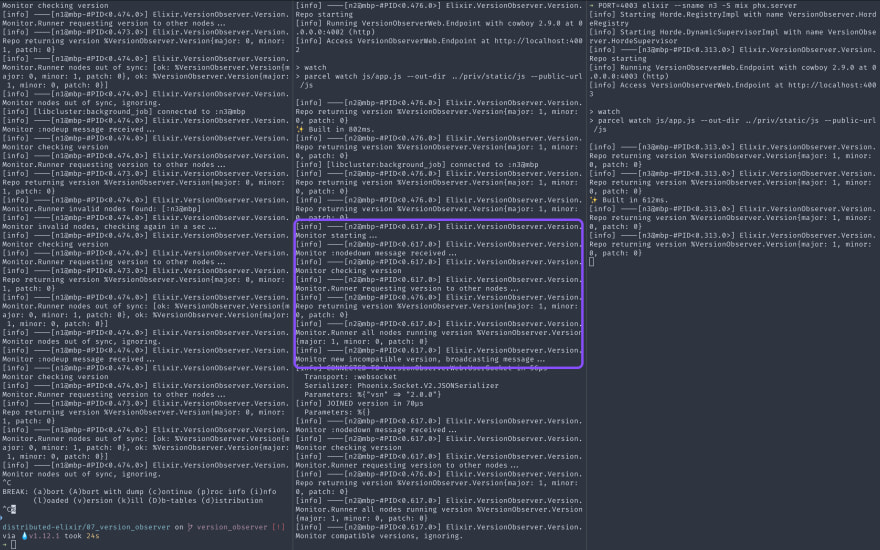29
Three real-world examples of distributed Elixir (pt. 4)
In the previous part of the series, we built a distributed download request manager and tracker, taking advantage of Elixir's distributed capabilities. In this fourth and last part, we will implement a real-world example which consists of a widespread pattern in which a web service serves a JavaScript single-page application. One of the issues that can occur in this type of scenario is that we have users that keep the browser open for long sessions, in which there can be multiple deployments of the service. If any of the versions that we deploy contain breaking changes between the front-end and the back-end, they will most likely experience unexpected errors due to outdated UI versions. A good example would be changing some business logic behind a form submission that depends on a new field, which is not currently being sent because the outdated UI is not rendering, even though the backend is expecting it. This scenario gets even trickier when you can have multiple instances of your application running simultaneously, and you can have multiple nodes running different versions temporarily until the cluster eventually syncs. A best practice to prevent a bad user experience consists of displaying a warning message to the user suggesting a page refresh to get the latest app version. Let's get cracking!
For this particular example, we are going to build a new web application consisting of two different parts:
Let's start by scaffolding the new project:
mix phx.new version_observer --no-ecto --no-live --no-dashboard --no-gettextAfter everything gets installed, let' add the necessary dependencies:
# ./mix.exs
defmodule VersionObserver.MixProject do
use Mix.Project
# ...
defp deps do
[
# ...
{:libcluster, "~> 3.3"},
{:horde, "~> 0.8.3"}
]
end
# ...
endAnd configure the cluster:
# ./lib/version_observer/application.ex
defmodule VersionObserver.Application do
use Application
def start(_type, _args) do
children = [
{Cluster.Supervisor, [topologies(), [name: BackgroundJob.ClusterSupervisor]]},
# Start the Telemetry supervisor
VersionObserverWeb.Telemetry,
# Start the PubSub system
{Phoenix.PubSub, name: VersionObserver.PubSub},
# Start Horde
VersionObserver.HordeRegistry,
VersionObserver.HordeSupervisor,
VersionObserver.NodeObserver,
# Start the Endpoint (http/https)
VersionObserverWeb.Endpoint
# Start a worker by calling: VersionObserver.Worker.start_link(arg)
# {VersionObserver.Worker, arg}
]
opts = [strategy: :one_for_one, name: VersionObserver.Supervisor]
Supervisor.start_link(children, opts)
end
# ...
defp topologies do
[
background_job: [
strategy: Cluster.Strategy.Gossip
]
]
end
endJust like we did in the previous part, we are going to be copy the
DownloadManager.{HordeRegistry, HordeSupervisor, NodeObserver} modules from the previous example source code repository, and pasting them into out brand new project, renaming their namespace accordingly to VersionObserver.*. We have to make a subtle change in the NodeObserver module, though:# lib/version_observer/node_observer.ex
defmodule VersionObserver.NodeObserver do
use GenServer
# ...
alias Phoenix.PubSub
@topic "node_observer"
def topic, do: @topic
def handle_info({:nodeup, _node, _node_type}, state) do
# ...
PubSub.broadcast(VersionObserver.PubSub, @topic, :nodeup)
{:noreply, state}
end
def handle_info({:nodedown, _node, _node_type}, state) do
# ...
PubSub.broadcast(VersionObserver.PubSub, @topic, :nodedown)
{:noreply, state}
end
endIn this particular example, the node observer publishes
:nodeup and :nodedown messages through Phonenix.PubSub, which we will use later.Since we are going to be testing the final result locally, we need to provide a different port to each Phoenix's server instance that we start:
# ./config/dev.exs
use Mix.Config
config :version_observer, VersionObserverWeb.Endpoint,
http: [
port: String.to_integer(System.get_env("PORT") || "4000")
],
# ...Frontend-wise, we are going to get rid of Phoenix's default webpack set up in favor of Parcel, which is faster and does not need any additional configuration whatsoever:
# ./assets/package.json
{
"repository": {},
"description": " ",
"license": "MIT",
"scripts": {
"watch": "parcel watch js/app.js --out-dir ../priv/static/js --public-url /js"
},
"dependencies": {
"phoenix": "file:../deps/phoenix",
"phoenix_html": "file:../deps/phoenix_html"
},
"devDependencies": {
"@babel/core": "^7.14.6",
"elm": "^0.19.1-5",
"elm-hot": "^1.1.6",
"node-elm-compiler": "^5.0.6",
"parcel-bundler": "^1.12.5"
}
}# ./config/dev.exs
use Mix.Config
config :version_observer, VersionObserverWeb.Endpoint,
# ...
watchers: [
npm: ["run", "watch", cd: Path.expand("../assets", __DIR__)]
]
# ...We will not be diving into the front-end Elm application internals. However, you can find its source code here. Nevertheless, we need to initialize it into our main JS file:
// ./assets/js/app.js
import { Elm } from '../src/Main.elm';
import socket from './socket';
import '../css/app.css';
import 'phoenix_html';
const { appVersion } = window;
const app = Elm.Main.init({ flags: { appVersion } });The critical part is the
appVersion variable that we pass as a flag to the Elm application. This appVersion holds the version value of the Phoenix instance that serves the initial HTML that renders JavaScript single-page application. In this case, we are taking it from the window object, but where do we get its value, and where do we set it?If we take a closer look at the
mix.exs file, one of the configuration options that the project/0 function returns is version:# ./mix.exs
defmodule VersionObserver.MixProject do
use Mix.Project
def project do
[
app: :version_observer,
version: "0.1.0",
# ...
]
end
# ...
endWe are going to use this value to set and read the current version of the application. Setting its value is straightforward; we only need to update it and rebuild the project. How do we read it, though? Elixir has a convenient Application.spec/1 function that returns the specifications of a given application:
iex(1)> Application.spec(:version_observer)
[
description: 'version_observer',
id: [],
vsn: '0.1.0',
modules: [VersionObserver, VersionObserver.Application,
VersionObserver.HordeRegistry, VersionObserver.HordeSupervisor,
VersionObserver.NodeObserver, VersionObserver.Version.Monitor,
VersionObserver.Version.Monitor.Runner,
VersionObserver.Version.Monitor.Starter, VersionObserver.Version.Repo,
VersionObserverWeb, VersionObserverWeb.Endpoint,
VersionObserverWeb.ErrorHelpers, VersionObserverWeb.ErrorView,
VersionObserverWeb.LayoutView, VersionObserverWeb.PageController,
VersionObserverWeb.PageView, VersionObserverWeb.Router,
VersionObserverWeb.Router.Helpers, VersionObserverWeb.Telemetry,
VersionObserverWeb.UserSocket, VersionObserverWeb.VersionChannel],
maxP: :infinity,
maxT: :infinity,
registered: [],
included_applications: [],
optional_applications: [],
applications: [:kernel, :stdlib, :elixir, :logger, :runtime_tools, :phoenix,
:phoenix_html, :phoenix_live_reload, :telemetry_metrics, :telemetry_poller,
:jason, :plug_cowboy, :libcluster, :horde],
mod: {VersionObserver.Application, []},
start_phases: :undefined
]The option that we are looking for is
:vsn, which we can get directly using Application.spec(:version_observer, :vsn).iex(1)> Application.spec(:version_observer, :vsn)
'0.1.0'Let's implement a module that represents the version of our application:
# ./lib/version_observer/version.ex
defmodule VersionObserver.Version do
alias __MODULE__
@type t :: %Version{
major: non_neg_integer,
minor: non_neg_integer,
patch: non_neg_integer
}
defstruct major: 0, minor: 0, patch: 0
def from_string(value) do
with [major, minor, patch] <- to_chunks(value) do
{:ok, %Version{major: major, minor: minor, patch: patch}}
end
end
def incompatible?(%Version{major: major_1}, %Version{major: major_2}), do: major_1 != major_2
defp to_chunks(value) do
case String.split(value, ".") do
[_major, _minor, _patch] = chunks ->
Enum.map(chunks, &String.to_integer/1)
_ ->
{:error, :invalid_version}
end
rescue
_ ->
{:error, :invalid_version}
end
defimpl String.Chars do
def to_string(%Version{major: major, minor: minor, patch: patch}) do
"#{major}.#{minor}.#{patch}"
end
end
endThis module consists of a Version struct based on the semantic versioning specification and two helper functions:
from_string: builds a new struct from a string.incompatible?: it takes two versions and returns whether both are incompatible or not.It also implements the
String.Chars protocol, to convert a version into a string. For the sake of simplicity, the logic of this module is very simple, however, you can adapt it to your personal needs, especially the incompatible? implementation. To continue, let's add a new repository module in charge of storing the application version:# ./lib/version_observer/version/repo.ex
defmodule VersionObserver.Version.Repo do
use GenServer
alias VersionObserver.Version
def start_link(opts) do
name = Keyword.get(opts, :name, __MODULE__)
GenServer.start_link(__MODULE__, %{}, name: name)
end
def get(name \\ __MODULE__), do: GenServer.call(name, :get)
@impl true
def init(_) do
{:ok, version} =
:version_observer
|> Application.spec(:vsn)
|> to_string()
|> Version.from_string()
{:ok, version}
end
@impl GenServer
def handle_call(:get, _, version) do
{:reply, {:ok, version}, version}
end
endThe
VersionObserver.Version.Rep module is a basic GenServer implementation that takes the :vsn value from the application, builds a new %Version{} with it, and stores it in its state. It also exposes a get/0 function that returns the stored version struct. Finally, we have to add the repo to the main application's children specification:# ./lib/version_observer/application.ex
defmodule VersionObserver.Application do
use Application
def start(_type, _args) do
children = [
# ...
VersionObserver.Version.Repo,
# ...
]
end
# ...
endAnd expose a convenient function in the main
VersionObserver module:# ./lib/version_observer.ex
defmodule VersionObserver do
defdelegate get_current_version, to: VersionObserver.Version.Repo, as: :get
endJumping to
IEX and requesting the version should return the following:Interactive Elixir (1.12.1) - press Ctrl+C to exit (type h() ENTER for help)
iex(1)> VersionObserver.get_current_version()
{:ok, %VersionObserver.Version{major: 0, minor: 1, patch: 0}}It works like a charm. Let's update the main layout view and template to set the current value in the
window object:# ./lib/version_observer_web/templates/layout/app.html.eex
<!DOCTYPE html>
<html lang="en">
<head>
<%# ... %>
<script>window.appVersion = '<%= get_current_version() %>';</script>
</head>
<body>
<%= @inner_content %>
</body>
</html># ./lib/version_observer_web/views/layout_view.ex
defmodule VersionObserverWeb.LayoutView do
use VersionObserverWeb, :view
def get_current_version do
{:ok, version} = VersionObserver.get_current_version()
to_string(version)
end
endIf we now start the Phoenix server and visit http://localhost:4000, we should see the single-page application getting rendered correctly:

At this point, we have or base application ready. When a user visits the home page, the main layout renders, setting the current version of the application and starting the JS app, passing the version as a flag. However, if we deploy a different version number, the user will still be running the app's initial version unless there is a page refresh. How can we alert the user about this?
If we start different nodes, they will be running their own
NodeObserver.Version.Repo that stores their application version. We need a new process, unique across all nodes, that listens to topology changes in the cluster, broadcasting any version changes when they occur. Following the same approach that we did in the second part, let's implement a singleton process to take care of this task:# ./lib/version_observer/version/monitor.ex
defmodule VersionObserver.Version.Monitor do
use GenServer
alias __MODULE__.Runner
alias Phoenix.PubSub
alias VersionObserver.{NodeObserver, Version}
@publish_opic "version_monitor"
def start_link(opts) do
name = Keyword.get(opts, :name, __MODULE__)
subscribe_topic = Keyword.get(opts, :subscribe_topic, NodeObserver.topic())
GenServer.start_link(__MODULE__, subscribe_topic, name: name)
end
def init(subscribe_topic) do
PubSub.subscribe(VersionObserver.PubSub, subscribe_topic)
{:ok, %Version{}}
end
def handle_info(:nodeup, state) do
{:noreply, state, {:continue, :check}}
end
def handle_info(:nodedown, state) do
{:noreply, state, {:continue, :check}}
end
def handle_continue(:check, state) do
with {:ok, new_version} <- Runner.run(),
true <- Version.incompatible?(new_version, state) do
Process.sleep(1_000)
PubSub.broadcast(
VersionObserver.PubSub,
@publish_topic,
{:new_version, to_string(new_version)}
)
{:noreply, new_version}
else
false ->
{:noreply, state}
{:error, :invalid_nodes} ->
Process.sleep(1_000)
{:noreply, state, {:continue, :check}}
{:error, :out_of_sync} ->
{:noreply, state}
end
end
endThe
VersionObserver.Version.Monitor is another straightforward GenServer implementation, which takes its name and subscribe_topic from the start_link/1 function options. On its init/1 function, it takes the subscribe_topic to subscribe to the Phoenix.PubSub node observer topic, that we will see in a moment, and sets an empty %Version{} as its state. Subscribing to this topic involves that the monitor process will receive incoming messages whenever nodes join or leave the cluster, so we need to implement this message handling with their corresponding handle_info(:nodeup, state) and handle_info(:nodedown, state) callbacks, which return a {:continue, :check} tuple handled by handle_continue(:check, state), which:Runner.run/0 module function, which we will see now, which checks if all nodes run the same application version.Phoenix.Pubsub if so.{:error, :invalid_nodes}, it means that the new nodes are still starting, and it sleeps for a second and retries the whole process again by returning {:continue, :check}.{:error, :out_of_sync}, it means that there are nodes currently running different versions of the application, probably due to an ongoing deployment, so we need to wait until it finishes and the cluster recovers.Let's add the runner module:
# ./lib/version_observer/version/monitor/runner.ex
defmodule VersionObserver.Version.Monitor.Runner do
alias VersionObserver.Version.Repo
def run do
case GenServer.multi_call(Repo, :get) do
{nodes, []} ->
do_check(nodes)
{_, invalid_nodes} ->
{:error, :invalid_nodes}
end
end
defp do_check(nodes) do
nodes
|> Keyword.values()
|> Enum.uniq()
|> case do
[{:ok, version}] ->
{:ok, version}
other ->
{:error, :out_of_sync}
end
end
endThe
run/0 function runs GenServer.multi_call/4, which calls all the NodeObserver.Version.Repo process in the cluster. The result is a tuple containing two elements:[node, result].If there are invalid nodes, it returns a
{:error, :invalid_nodes} tuple. On the other hand, if all nodes have replied correctly, it takes all the unique versions and checks if there is only one, which means that all nodes are running the same one, returning {:ok, version} or {:error, :out_of_sync} if the contrary. The last thing we have to implement is the process that starts and registers the singleton NodeObserver.Version.Monitor globally across the cluster:# ./lib/version_observer/version/monitor/starter.ex
defmodule VersionObserver.Version.Monitor.Starter do
require Logger
alias VersionObserver.{
HordeRegistry,
HordeSupervisor,
Version.Monitor
}
# ...
def start_link(opts) do
name =
opts
|> Keyword.get(:name, Monitor)
|> via_tuple()
opts = Keyword.put(opts, :name, name)
child_spec = %{
id: Monitor,
start: {Monitor, :start_link, [opts]}
}
HordeSupervisor.start_child(child_spec)
:ignore
end
defp via_tuple(name) do
{:via, Horde.Registry, {HordeRegistry, name}}
end
end# ./lib/version_observer/application.ex
defmodule VersionObserver.Application do
use Application
def start(_type, _args) do
children = [
# ...
VersionObserver.Version.Monitor.Starter,
# ...
]
opts = [strategy: :one_for_one, name: VersionObserver.Supervisor]
Supervisor.start_link(children, opts)
end
# ...
endThe only thing left is to subscribe to the
NodeObserver.Version.Monitor messages and show the corresponding alert to the user. To achieve this, let's add a new Phoenix channel module:# ./lib/version_observer_web/channels/user_socket.ex
defmodule VersionObserverWeb.UserSocket do
use Phoenix.Socket
channel("version", VersionObserverWeb.VersionChannel)
# ...
end# ./lib/version_observer_web/channels/version_channel.ex
defmodule VersionObserverWeb.VersionChannel do
use VersionObserverWeb, :channel
alias Phoenix.PubSub
def join("version", _payload, socket) do
PubSub.subscribe(VersionObserver.PubSub, "version_monitor")
{:ok, socket}
end
def handle_info({:new_version, version}, socket) do
push(socket, "new_version", %{version: version})
{:noreply, socket}
end
endWhen the client joins the channel, its process subscribes to the version monitor topic, pushing any new version through the socket. We also need to change the
app.js logic to pass the new version to the JavaScript single-page application:// ./assets/js/app.js
// ...
const channel = socket.channel('version', {});
channel.join()
.receive('ok', (resp) => {
channel.on('new_version', ({ newVersion }) => {
app.ports.newVersion.send(newVersion);
});
});Finally, the logic inside the Elm, React, or whatever front-end technology you choose should be straightforward. It compares the version it received via its initialization flags to the one received from the Phoenix socket client, displaying the corresponding message suggesting to refresh the page. Let's jump back to the terminal, start the load balancer like in the previous part, and start a a couple of instances of our application, and try to simulate some deployments:

n1 starts, and as soon as n2 joins the cluster, the VersionObserver.Version.Monitor receives a :nodeup message from the VersionObserver.NodeObserver, requesting the application version to all the nodes. However, n2 is not yet ready, so it receives the invalid nodes error, making the monitor retry again after a second. In the second attempt, n2 is ready, and both nodes have the same version, so nothing else happens. Let's kill all the instances and start a single one, and visit http://localhost:
Next, let's update the
mix.exs file, setting the version value to a new major value, and start n2 and n3:# ./mix.exs
defmodule VersionObserver.MixProject do
use Mix.Project
def project do
[
app: :version_observer,
version: "1.0.0",
# ...
]
end
# ...
end
n2 and n3 start, and the version monitor running on n1 starts checking for the version on each node, ending up receiving two different: version 0.1.0 running in n1 and 1.0.0 running in both n2 and n3. Let's kill n1, leaving the cluster with nodes that have the same version:
If we check the browser, we should see the corresponding message popping up:

Yay!
In this series, we have seen how to build a cluster of Elixir nodes and take advantage of its distribution capabilities to implement three different creative solutions to real-world problems, otherwise impossible without adding external dependencies and complexity to our projects. This power and flexibility make me like Elixir so much and enjoy writing back-end code every day. I hope you enjoyed the posts as much as I did writing them, and if you have any examples about distributed Elixir solutions, please share them with me, I'd love to hear from you 🙌.
Happy coding!
 bigardone
/
distributed-elixir-examples
bigardone
/
distributed-elixir-examples
Code examples for the "Three real-world examples of distributed Elixir" blog series
29
